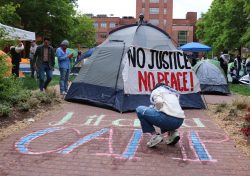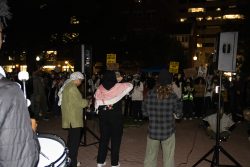The D.C. Court of Appeals denied Georgetown University’s request for a stay regarding portions of the Board of Zoning and Adjustment’s conditions for the campus Ten-Year Plan.
Despite the June 20 ruling, both students and University neighbors are optimistic about progress that has been made in the past year and the future of community relations.
The BZA modifications to the University’s Ten-Year Plan stipulated that the University make public the records of student misconduct and auto ownership, an edict that the University claimed violates the Family Educational Rights and Privacy act of 1974 and the D.C. Human Rights Act.
Although the decision came as a setback to students, there has been positive progress outside of court, said ANC 2E Commissioner Justin Wagner (CAS ‘03).
“Things are improving between the students and the community. People aren’t afraid to come together and talk. There’s a forum for it,” Wagner said.
ANC 2E Chairman Peter Pulsifer stated that the ruling could benefit all involved parties.
“The ruling has the potential to improve community relations if Georgetown takes the provisions seriously. The whole goal is to reduce the impact the University has on the community. The smaller the negative impact, the less conflict there is,” Pulsifer said.
The 1958 D.C. Zoning regulations require Georgetown to submit a proposal to the BZA every 10 years detailing its predicted growth and plans for change.
The June 20 ruling is only the most recent confrontation between the University and the community over the 2000 Ten-Year Plan.
Georgetown’s plan outlined a new 800-bed dormitory to placate the community’s complaints about student misconduct off-campus.
The on-campus housing expansion was coupled with a request to increase the student body by 389 to 6,800 students. Due to public outcry the University withdrew its request in November 2001.
The BZA announced on Nov. 8, 2000 that it would support the University’s latest plan provided that Georgetown complied with certain conditions set at a later date.
On Aug. 6, 2001, the BZA set forth a list of 19 conditions, including one stating that the University keep a record of all complaints of student misconduct and subsequent actions taken by the University. The University would be required to report this data quarterly to groups such as the D.C. Office of Planning, the Advisory Neighborhood Commission 2E and the BZA.
The University filed its request for a stay in August 2001. Although the motion was denied, the case is still pending.
“[Georgetown] expects to proceed with briefing by both parties after the court issues a scheduling order,” said Assistant Vice President of Communications Julie Green Bataille.
Barbara Zartman of the Citizen’s Association of Georgetown said that the D.C. Court of Appeals decision is only the first step in a long process.”The Citizen’s Association is waiting for the University’s complete argument,” Zartman said.




